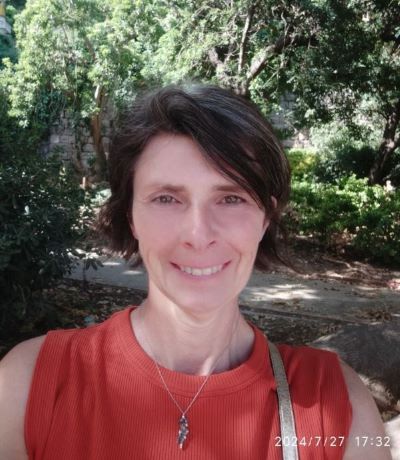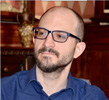Studying at the University of Verona
Here you can find information on the organisational aspects of the Programme, lecture timetables, learning activities and useful contact details for your time at the University, from enrolment to graduation.
Academic calendar
The academic calendar shows the deadlines and scheduled events that are relevant to students, teaching and technical-administrative staff of the University. Public holidays and University closures are also indicated. The academic year normally begins on 1 October each year and ends on 30 September of the following year.
Course calendar
The Academic Calendar sets out the degree programme lecture and exam timetables, as well as the relevant university closure dates..
| Period | From | To |
|---|---|---|
| Sem. IA | Sep 25, 2017 | Nov 11, 2017 |
| Sem. IB | Nov 13, 2017 | Jan 20, 2018 |
| Sem. IIA | Feb 26, 2018 | Apr 21, 2018 |
| Sem. IIB | Apr 23, 2018 | Jun 9, 2018 |
| Session | From | To |
|---|---|---|
| Sessione Invernale | Jan 22, 2018 | Feb 24, 2018 |
| Sessione Estiva | Jun 11, 2018 | Jul 28, 2018 |
| Sessione Autunnale | Aug 27, 2018 | Sep 22, 2018 |
| Sessione Straordinaria | Jan 14, 2019 | Feb 16, 2019 |
| Session | From | To |
|---|---|---|
| Sessione Estiva | Jul 16, 2018 | Jul 21, 2018 |
| Sessione Autunnale | Nov 12, 2018 | Nov 17, 2018 |
| Sessione Primaverile | Apr 1, 2019 | Apr 6, 2019 |
| Period | From | To |
|---|---|---|
| All Saints Day | Nov 1, 2017 | Nov 1, 2017 |
| Immaculate Conception | Dec 8, 2017 | Dec 8, 2017 |
| Christmas break | Dec 22, 2017 | Jan 7, 2018 |
| Easter break | Mar 30, 2018 | Apr 3, 2018 |
| Liberation Day | Apr 25, 2018 | Apr 25, 2018 |
| Labour Day | May 1, 2018 | May 1, 2018 |
| Patron Saint Day | May 21, 2018 | May 21, 2018 |
| Republic Day | Jun 2, 2018 | Jun 2, 2018 |
| Summer break | Aug 13, 2018 | Aug 18, 2018 |
Exam calendar
Exam dates and rounds are managed by the relevant Humanistic Studies Teaching and Student Services Unit.
To view all the exam sessions available, please use the Exam dashboard on ESSE3.
If you forgot your login details or have problems logging in, please contact the relevant IT HelpDesk, or check the login details recovery web page.
Academic staff
 cristina.bertazzoni@univr.it
cristina.bertazzoni@univr.it
 donato.desilvestri@univr.it
donato.desilvestri@univr.it

Longo Mario
 mario.longo@univr.it
mario.longo@univr.it
 045 8028393
045 8028393
 federico.melotto@univr.it; federicomelotto@hotmail.com
federico.melotto@univr.it; federicomelotto@hotmail.com

Migliorati Lorenzo
 lorenzo.migliorati@univr.it
lorenzo.migliorati@univr.it
 045802 8135
045802 8135
 andrea.nicolini.uni@gmail.com - andrea.nicolini@univr.it
andrea.nicolini.uni@gmail.com - andrea.nicolini@univr.it
 igor.pelgreffi@univr.it
igor.pelgreffi@univr.it
 stefania.pontrandolfo@univr.it
stefania.pontrandolfo@univr.it
 pieralberto.porcedducilione@univr.it; pierre_pordd@yahoo.it
pieralberto.porcedducilione@univr.it; pierre_pordd@yahoo.it
 045 8028732
045 8028732
Study Plan
The Study Plan includes all modules, teaching and learning activities that each student will need to undertake during their time at the University.
Please select your Study Plan based on your enrollment year.
1° Year
| Modules | Credits | TAF | SSD |
|---|
A course to be chosen among the following2° Year activated in the A.Y. 2018/2019
| Modules | Credits | TAF | SSD |
|---|
A course to be chosen among the followingA course to be chosen among the followingA course to be chosen among the following3° Year activated in the A.Y. 2019/2020
| Modules | Credits | TAF | SSD |
|---|
A course to be chosen among the followingA course to be chosen among the followingA course to be chosen among the following| Modules | Credits | TAF | SSD |
|---|
A course to be chosen among the following| Modules | Credits | TAF | SSD |
|---|
A course to be chosen among the followingA course to be chosen among the followingA course to be chosen among the following| Modules | Credits | TAF | SSD |
|---|
A course to be chosen among the followingA course to be chosen among the followingA course to be chosen among the following| Modules | Credits | TAF | SSD |
|---|
Legend | Type of training activity (TTA)
TAF (Type of Educational Activity) All courses and activities are classified into different types of educational activities, indicated by a letter.
Cultural Anthropology (2017/2018)
Teaching code
4S00742
Teacher
Coordinator
Credits
9
Language
Italian
Scientific Disciplinary Sector (SSD)
M-DEA/01 - DEMOLOGY, ETHNOLOGY AND ANTHROPOLOGY
Period
Sem. IIA, Sem. IIB
Learning outcomes
Knowledge and understanding
At the end of the course the student should:
- have a basic knowledge of the fundamentals of socio-cultural anthropology in the various fields of political and economical anthropology, of social inequalities and of the contemporary globalized world needed to understand human variation from a social and cultural viewpoint;
- have a basic knowledge of the main theoretical arguments in the socio-cultural anthropology field and the more common forms of racism in the contemporary world in order to plan, perform and assess educational projects with an inclusivity and inter-cultural dialogue perspective.
Applying knowledge and understanding
At the end of the course, the student should be able to:
- promote cultural decentralization and consequently affective, cognitive, relational and social autonomies;
- implement the acquired anthropological knowledge in order to intervene in situations of marginalization and integration difficulties, also by recognizing and assessing different family up-bringing models and different cultural styles of understanding;
- use strategies to oppose various forms of racism in different educational and/or social contexts.
Making judgements
At the end of the course, the student will have acquired:
- the capacity to question the socio-cultural variation of models and educational processes;
- the capacity to critically analyze, outline and implement educational interventions with an inclusivity and inter-cultural dialogue perspective.
Communication skills
At the end of the course, the student should be able to:
- consciously and critically use specific terms relating to socio-cultural diversity;
- inform of his/her own educational choices and know how to constructively compare his/her own decisions with other people's views.
Learning skills
At the end of the course, the student should be able to:
- recognize various educational background models and different learning styles and adopt suitable educational strategies;
- consider himself/herself to be within a permanent learning trend in terms of the fluidity of socio-cultural processes in contemporary education contexts.
Program
Requirements
No particular requirements needed.
Content
The course content regards:
- introduction to the conceptual methods and tools of basic socio-cultural anthropology (especially the concepts of culture and society);
- the fundamentals of socio-cultural anthropology in the various fields of political and economical anthropology, of social inequalities and of the contemporary globalized world;
- the fundamentals of socio-cultural anthropology in the study of the various forms of present-day racism.
- the fundamentals of anthropology of migrations
Teaching methods
Lectures in which numerous ethnographic examples (also taken from the professional educational contexts) will be presented to support the teaching/learning of the discipline's basic concepts
Texts
E. A. Schultz and R. H. Lavenda, 2015, Antropologia culturale, Zanichelli, Bologna (only the third Italian edition).
- only chapters 1-2-3-7-8-9-10 -12-14
- in chapter 10, only the two paragraphs on pages 256-257
- in chapter 14, ignore the paragraphs from page 413 to page 424
B. Riccio (ed.), 2014, Antropologia e migrazioni, Rome, CISU.
- only chapters 1-2-6-9-10-11-12-17-19
B. Sorgoni (ed.), 2011, Etnografia dell'accoglienza. Rifugiati e richiedenti asilo a Ravenna, Rome, CISU.
Riccio, B., 2007, "Toubab" e "vu cumprà". Transnazionalità e rappresentazioni nelle migrazioni senegalesi in Italia, Padova: CLEUP.
| Author | Title | Publishing house | Year | ISBN | Notes |
|---|---|---|---|---|---|
| E. A. Schultz e R. H. Lavenda | Antropologia culturale (Edizione 3) | Zanichelli | 2015 | 978-88-08-15131-5 | |
| B. Riccio (a cura di) | Antropologia e migrazioni | CISU | 2014 | 978-88-7975-590-0 | |
| B. Sorgoni (a cura di) | Etnografia dell'accoglienza. Rifugiati e richiedenti asilo a Ravenna (Edizione 1) | CISU | 2011 | 978-88-7975-526-9 | |
| Riccio, B. | "Toubab" e "vu cumprà". Transnazionalità e rappresentazioni nelle migrazioni senegalesi in Italia (Edizione 1) | CLEUP | 2007 | 978-88-6129-064-8 |
Examination Methods
Learning assessment method
The assessment method will be NO different for attending and non-attending students.
Learning levels will be assessed by a written examination.
The student must be able to demonstrate:
- to have understood the important elements of the discipline's main theoretical arguments;
- to be able to express their own reasoning in a precise manner and in a limited amount of time, identifying and selecting the essential elements;
- to be able to critically analyze and connect the ethnographic examples studied to the theory.
Results
The results of the examination will be given on a scale of thirty.
The written examination will contain 6 open questions to which a maximum of 5 points will be attributed to each answer.
Type D and Type F activities
Modules not yet included
Career prospects
Module/Programme news
News for students
There you will find information, resources and services useful during your time at the University (Student’s exam record, your study plan on ESSE3, Distance Learning courses, university email account, office forms, administrative procedures, etc.). You can log into MyUnivr with your GIA login details: only in this way will you be able to receive notification of all the notices from your teachers and your secretariat via email and also via the Univr app.
Graduation
Documents
| Title | Info File |
|---|---|
|
|
pdf, it, 109 KB, 12/07/24 |
|
|
pdf, it, 112 KB, 14/05/24 |
List of thesis proposals
| theses proposals | Research area |
|---|---|
| Ambienti e contesti di lavoro con minori | Various topics |
| Analisi dei personal network di sostegno | Various topics |
| comunicazioni relative alla tesi | Various topics |
| Il teatro come contesto educativo | Various topics |
| I processi di globalizzazione culturale nella società contemporanea | Various topics |
| La social network analysis applicata allo studio dei contesti educativi | Various topics |
| L'educatore ed i progetti europei | Various topics |
| L'impegno associativo in ambito educativo | Various topics |
| Politiche sociali e contesti educativi | Various topics |
| Progetti di collaborazione con le istituzioni scolastiche | Various topics |
| PROPOSTE TESI AMBITO GEOGRAFICO | Various topics |
| Scuola e capitale sociale | Various topics |
Linguistic training CLA
Gestione carriere
Student mentoring
Practical information for students
Documents
| Title | Info File |
|---|---|
|
|
pdf, it, 325 KB, 16/07/24 |
|
|
pdf, it, 212 KB, 02/05/23 |
|
|
pdf, it, 131 KB, 02/05/23 |
Stage e Tirocini
Le ulteriori attività formative (crediti F) sono interamente coperte dall’attività di tirocinio “indiretto” (1 cfu) da svolgersi nel secondo anno e di tirocinio “diretto” (14 cfu) da svolgersi presso enti convenzionati per un numero complessivo di 15 cfu (375 ore). Chi è iscritta/o al curriculum servizi per l’infanzia è tenuta/o a svolgere il tirocinio presso nidi e servizi per la prima infanzia per almeno il 50% delle ore.
Il tirocinio professionalizzante (375 ore, pari a 15 cfu), è obbligatorio sia nella sua forma diretta che indiretta.
Il tirocinio indiretto, della durata di 25 ore a frequenza obbligatoria al 75%, si svolge in Università per 20 ore e in forma di lavoro individuale per 5 ore e consiste in un accompagnamento iniziale delle/degli studenti da parte dei tutor attraverso un percorso formativo dotandoli di conoscenze e strumenti adeguati a osservare, comprendere e rielaborare criticamente l’esperienza di tirocinio nei servizi educativi e ad affrontare il tirocinio negli enti con metodo e consapevolezza. Il percorso, da attuare in gruppi da 20-25 persone sotto la supervisione di un tutor, risponde alle esigenze costantemente espresse sia dalle/dagli studenti stessi sia dalle parti sociali che dai referenti degli enti convenzionati.
Il tirocinio diretto si propone di raggiungere i seguenti obiettivi:
- fare esperienza diretta di attività professionali, che richiedono un livello di preparazione al lavoro educativo;
- approfondire in particolare il rapporto tra preparazione teorica, acquisita mediante lo studio, ed esperienza pratica, tra mondo del sapere e della cultura e mondo del lavoro e delle professioni;
Al termine del tirocinio diretto lo studente deve presentare una relazione scritta, nella modalità concordata con il tutor accademico.
Nuove Linee Guida per il tirocinio di Scienze dell'educazione.
- Tutte le informazioni in merito agli stage per futuri studenti sono disponibili alla pagina Stage e tirocini.
- Tutte le informazioni in merito agli stage per studenti iscritti sono pubblicate in MyUnivr - come fare per - stage e tirocini.
- Tutte le informazioni in merito agli stage per le aziende sono disponili alla pagina Stage e tirocini per azienze.
Documents
| Title | Info File |
|---|---|
|
|
pdf, it, 302 KB, 16/07/21 |
Student login and resources
Modalità e sedi di frequenza
La frequenza non è obbligatoria.
Maggiori dettagli in merito all'obbligo di frequenza vengono riportati nel Regolamento del corso di studio disponibile alla voce Regolamenti nel menu Il Corso. Anche se il regolamento non prevede un obbligo specifico, verifica le indicazioni previste dal singolo docente per ciascun insegnamento o per eventuali laboratori e/o tirocinio.
È consentita l'iscrizione a tempo parziale. Per saperne di più consulta la pagina Possibilità di iscrizione Part time.
Le sedi di svolgimento delle lezioni e degli esami sono le seguenti
- Polo Zanotto (vicino si trova il Palazzo di Lettere)
- Palazzo ex Economia
- Polo Santa Marta
- Istituto ex Orsoline
- Palazzo Zorzi (Lungadige Porta Vittoria, 17 - 37129 Verona)
- Chiostro Santa Maria delle Vittorie, Lungadige Porta Vittoria, 41























